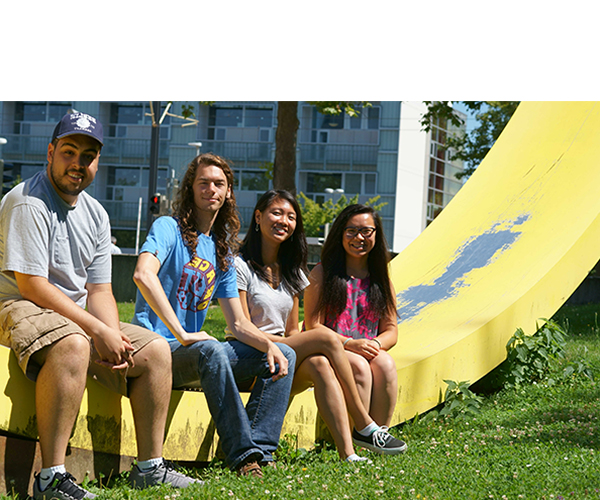
FLTR: Jean, Mackenna, Jenny, Larissa. Photo taken by Levin Sottru.
For neuroscientists and biomedical engineers, the cluster of excellence at Freiburg University offers ideal conditions for getting to know various labs and techniques. Jenny, Mackenna, Larissa, and Jean visited the cluster from US-based partner institutions IPAN and CSNE in order to expand their horizon. They were successful in doing so, albeit in unexpected ways.
Jenny is a student at the University of Michigan (member of IPAN), studying Neuroscience, and she visited Prof. Dr. Carola Haas’s lab. So far she had only done research on brains of flies, but now she had human tissue in front of her. She reports that it felt like the first “real” contact with a patient. For Larissa, who trains as a Neuroscientist at CSNE in Seattle, the contrast was even bigger. Before her internship in Prof. Dr. Wolfram Burgard’s work group she had no grasp of robotics. Now she is highly enthusiastic about the topic. It remains to be seen how the new interest influences her further studies. Mackenna, biomedical engineer in the making, who also studies at the University of Michigan, visited Prof. Dr. Ilka Diester’s optophysiology lab. He therefore dealt with the evaluation of fMRI data with modern biological techniques. He is not only proud to have gained new knowledge, but is also excited to take newly emerged research questions in the field of optogenetics home with him. The difference was less prominent for Jean Carlos, who studies at the Universidad de Puerto Rico (belonging to IPAN). As an intern in Prof. Dr. Ulrich Egert’s lab, the biologist, focusing on nicotine-receptors and intending to start a doctorate in Neuroscience, wants to engage more thoroughly with neuronal networks.
What unites all four who were here: they enjoyed the work climate and the continuous exchange amongst each other. They were impressed with public transport in Germany. A rather negligible, negative point of comparison was the lack of air-conditioning in many university institutions. BrainLinks-BrainTools is looking forward to sending a German student delegation to the US in the near future and to reporting about their scientific and cultural experiences there.